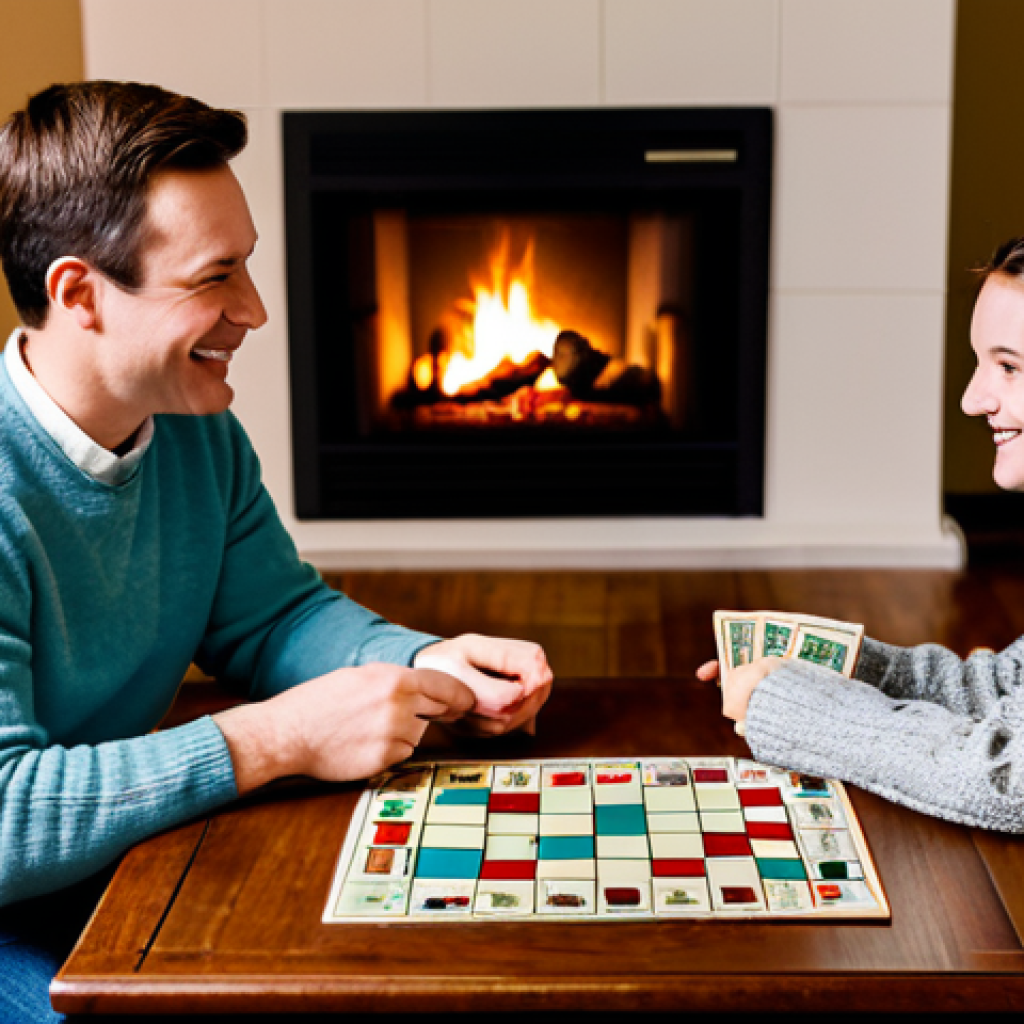Remember the satisfying *thwack* of a paddle against a ping pong ball, or the strategic silence hanging in the air during a game of chess? Before digital screens dominated our leisure time, classic analog games provided rich, tactile experiences that fostered connection and challenged our minds in tangible ways.
Personally, I’ve always cherished the warm, inviting simplicity of these games; they offer a delightful escape from the complexities of modern life. It’s fascinating to consider how these enduring pastimes are experiencing a resurgence, fueled by a yearning for authentic, screen-free entertainment.
Experts predict that as digital fatigue increases, the demand for traditional games will continue to grow, offering both nostalgic comfort and mindful engagement.
Let’s unpack the enduring appeal of classic analog games in greater detail below!
Classic analog games offer a wealth of benefits that often get overlooked in our digitally-saturated world. They encourage face-to-face interaction, sharpen cognitive skills, and provide a much-needed break from screens.
I still remember the hours my family spent huddled around a Monopoly board, the competitive spirit fierce, the laughter echoing through the house. These shared experiences created lasting memories that digital games simply can’t replicate.
Rediscovering the Joy of Board Games

Board games are experiencing a renaissance, offering a tangible alternative to video games. The tactile nature of moving pieces, rolling dice, and strategizing with physical components provides a sensory-rich experience that digital platforms can’t match.
It’s more than just entertainment; it’s about creating shared moments and strengthening relationships.
Unplug and Connect: The Social Element
Board games inherently foster social interaction. Unlike solitary video game experiences, board games require players to engage directly with one another, encouraging communication, negotiation, and even a bit of friendly competition.
Remember those intense Catan trades or the collaborative efforts to survive a Pandemic outbreak? These interactions build stronger bonds and create lasting memories.
Sharpening Your Mind: Strategic Thinking and Problem-Solving
Many board games demand strategic thinking, problem-solving, and critical decision-making. From the complex logistics of Ticket to Ride to the deductive reasoning required in Clue, board games challenge players to exercise their cognitive muscles in engaging ways.
My personal favorite, 7 Wonders, forces me to balance resource management with long-term strategy, keeping my brain firing on all cylinders.
The Timeless Appeal of Card Games
Card games, with their simplicity and versatility, remain a beloved pastime for people of all ages. Whether it’s a casual game of poker with friends or a strategic duel in Magic: The Gathering, card games offer endless opportunities for fun and mental stimulation.
I’ve always found the portability of a deck of cards to be incredibly appealing; it’s the perfect entertainment for travel or impromptu gatherings.
Beyond Solitaire: Diverse Gameplay Experiences
Card games encompass a wide range of genres, from trick-taking games like Bridge and Hearts to cooperative games like Hanabi. This diversity ensures that there’s a card game to suit every taste and skill level.
I recently discovered a cooperative card game called “The Crew,” which requires intricate communication and teamwork to complete missions in space. It’s incredibly challenging and rewarding!
A Budget-Friendly Entertainment Option
Compared to video games or other forms of entertainment, card games are relatively inexpensive. A single deck of cards can provide hours of entertainment for a fraction of the cost of a new video game.
Plus, many card games can be played with just a standard deck of cards, making them accessible to everyone.
The Understated Elegance of Dice Games
Dice games, often overlooked in favor of more complex board games, offer a unique blend of chance and strategy. The simple act of rolling dice can create moments of suspense, excitement, and unexpected twists, making them incredibly engaging and accessible to players of all ages.
I always keep a set of dice in my bag; you never know when a spontaneous game of Yahtzee might break out!
Quick and Engaging Gameplay
Dice games are typically quick to learn and play, making them perfect for short attention spans or casual gatherings. Games like Yahtzee, Farkle, and Tenzi can be played in a matter of minutes, providing instant gratification and endless replayability.
Mathematical Prowess in Disguise
While dice games may seem purely based on luck, many involve elements of probability, risk assessment, and strategic decision-making. Calculating the odds of rolling a specific combination or deciding when to re-roll can sharpen your mathematical skills without feeling like a chore.
Puzzles: More Than Just Pieces
Jigsaw puzzles, often considered a solitary activity, offer a unique form of mental relaxation and cognitive stimulation. The act of piecing together fragmented images can be incredibly meditative, allowing you to escape the stresses of daily life and focus on a single, achievable goal.
I find that working on a jigsaw puzzle before bed helps me unwind and clear my mind.
The Meditative Mindset
Focusing on the shapes, colors, and patterns of puzzle pieces can induce a state of mindfulness, similar to meditation. This can help reduce stress, improve concentration, and promote overall mental well-being.
Boosting Spatial Reasoning Skills
Working on jigsaw puzzles can enhance your spatial reasoning skills, improving your ability to visualize objects in three dimensions and mentally manipulate shapes.
This can be particularly beneficial for children’s cognitive development.
The Resurgence of Strategy Games: Chess and Go
Chess and Go, two of the world’s oldest and most complex strategy games, are experiencing a resurgence in popularity, thanks in part to online platforms and streaming services.
These games demand intense concentration, strategic foresight, and a deep understanding of positional play. While they can be challenging to learn, the rewards are immense.
I have spent countless hours studying chess openings and tactics, and the intellectual stimulation is unparalleled.
Beyond Casual: Tournaments and Online Communities
Both Chess and Go have thriving competitive scenes, with tournaments and online communities offering opportunities for players of all skill levels to test their mettle.
Whether you’re a seasoned grandmaster or a complete beginner, there’s a place for you in the world of strategy games.
A Workout for Your Brain: Enhancing Cognitive Abilities
Playing Chess and Go can significantly enhance your cognitive abilities, including memory, attention span, and problem-solving skills. The complex strategies and calculations involved require players to constantly adapt and think several steps ahead.
Tabletop Role-Playing Games: Storytelling and Imagination
Tabletop role-playing games (TTRPGs), such as Dungeons & Dragons, offer a unique blend of storytelling, improvisation, and social interaction. In these games, players create characters and embark on collaborative adventures guided by a game master.
I’ve been playing D&D for years, and it’s not just a game; it’s a creative outlet, a social gathering, and a chance to explore fantastical worlds.
Unleashing Creativity: Collaborative Storytelling
TTRPGs encourage players to unleash their creativity and imagination. As players develop their characters and interact with the game world, they contribute to a shared narrative, creating unique and memorable stories.
Building Social Skills: Teamwork and Communication
TTRPGs foster teamwork, communication, and problem-solving skills. Players must work together to overcome challenges, negotiate with non-player characters, and make critical decisions that impact the outcome of the game.
Here’s a table summarizing the benefits and features of different classic analog games:
| Game Type | Benefits | Features | Example Games |
|---|---|---|---|
| Board Games | Social interaction, strategic thinking, problem-solving | Tangible components, diverse themes, varying complexity | Monopoly, Catan, Ticket to Ride |
| Card Games | Versatility, portability, budget-friendly | Wide range of genres, from trick-taking to cooperative | Poker, Bridge, Magic: The Gathering |
| Dice Games | Quick gameplay, chance and strategy, mathematical skills | Simple rules, accessible to all ages, instant gratification | Yahtzee, Farkle, Tenzi |
| Puzzles | Mental relaxation, cognitive stimulation, spatial reasoning | Meditative mindset, focus and concentration, problem-solving | Jigsaw puzzles, crosswords, Sudoku |
| Strategy Games | Intense concentration, strategic foresight, cognitive enhancement | Complex rules, positional play, competitive scenes | Chess, Go |
| Tabletop RPGs | Creativity, storytelling, social interaction | Collaborative adventures, character development, improvisation | Dungeons & Dragons, Pathfinder |
Reconnecting with Simplicity: The Joy of Analog
In our fast-paced, digitally-driven world, classic analog games offer a welcome respite from the constant stimulation of screens. They provide an opportunity to slow down, connect with others, and engage in activities that stimulate our minds and foster creativity.
Personally, I find that unplugging from technology and immersing myself in a board game or puzzle is incredibly therapeutic. It allows me to reconnect with myself and the people I care about, creating memories that will last a lifetime.
Let’s embrace the joy of analog and rediscover the simple pleasures of classic games. Classic analog games offer a wealth of benefits that often get overlooked in our digitally-saturated world.
They encourage face-to-face interaction, sharpen cognitive skills, and provide a much-needed break from screens. I still remember the hours my family spent huddled around a Monopoly board, the competitive spirit fierce, the laughter echoing through the house.
These shared experiences created lasting memories that digital games simply can’t replicate.
Rediscovering the Joy of Board Games
Board games are experiencing a renaissance, offering a tangible alternative to video games. The tactile nature of moving pieces, rolling dice, and strategizing with physical components provides a sensory-rich experience that digital platforms can’t match. It’s more than just entertainment; it’s about creating shared moments and strengthening relationships.
Unplug and Connect: The Social Element
Board games inherently foster social interaction. Unlike solitary video game experiences, board games require players to engage directly with one another, encouraging communication, negotiation, and even a bit of friendly competition. Remember those intense Catan trades or the collaborative efforts to survive a Pandemic outbreak? These interactions build stronger bonds and create lasting memories.
Sharpening Your Mind: Strategic Thinking and Problem-Solving

Many board games demand strategic thinking, problem-solving, and critical decision-making. From the complex logistics of Ticket to Ride to the deductive reasoning required in Clue, board games challenge players to exercise their cognitive muscles in engaging ways. My personal favorite, 7 Wonders, forces me to balance resource management with long-term strategy, keeping my brain firing on all cylinders.
The Timeless Appeal of Card Games
Card games, with their simplicity and versatility, remain a beloved pastime for people of all ages. Whether it’s a casual game of poker with friends or a strategic duel in Magic: The Gathering, card games offer endless opportunities for fun and mental stimulation. I’ve always found the portability of a deck of cards to be incredibly appealing; it’s the perfect entertainment for travel or impromptu gatherings.
Beyond Solitaire: Diverse Gameplay Experiences
Card games encompass a wide range of genres, from trick-taking games like Bridge and Hearts to cooperative games like Hanabi. This diversity ensures that there’s a card game to suit every taste and skill level. I recently discovered a cooperative card game called “The Crew,” which requires intricate communication and teamwork to complete missions in space. It’s incredibly challenging and rewarding!
A Budget-Friendly Entertainment Option
Compared to video games or other forms of entertainment, card games are relatively inexpensive. A single deck of cards can provide hours of entertainment for a fraction of the cost of a new video game. Plus, many card games can be played with just a standard deck of cards, making them accessible to everyone.
The Understated Elegance of Dice Games
Dice games, often overlooked in favor of more complex board games, offer a unique blend of chance and strategy. The simple act of rolling dice can create moments of suspense, excitement, and unexpected twists, making them incredibly engaging and accessible to players of all ages. I always keep a set of dice in my bag; you never know when a spontaneous game of Yahtzee might break out!
Quick and Engaging Gameplay
Dice games are typically quick to learn and play, making them perfect for short attention spans or casual gatherings. Games like Yahtzee, Farkle, and Tenzi can be played in a matter of minutes, providing instant gratification and endless replayability.
Mathematical Prowess in Disguise
While dice games may seem purely based on luck, many involve elements of probability, risk assessment, and strategic decision-making. Calculating the odds of rolling a specific combination or deciding when to re-roll can sharpen your mathematical skills without feeling like a chore.
Puzzles: More Than Just Pieces
Jigsaw puzzles, often considered a solitary activity, offer a unique form of mental relaxation and cognitive stimulation. The act of piecing together fragmented images can be incredibly meditative, allowing you to escape the stresses of daily life and focus on a single, achievable goal. I find that working on a jigsaw puzzle before bed helps me unwind and clear my mind.
The Meditative Mindset
Focusing on the shapes, colors, and patterns of puzzle pieces can induce a state of mindfulness, similar to meditation. This can help reduce stress, improve concentration, and promote overall mental well-being.
Boosting Spatial Reasoning Skills
Working on jigsaw puzzles can enhance your spatial reasoning skills, improving your ability to visualize objects in three dimensions and mentally manipulate shapes. This can be particularly beneficial for children’s cognitive development.
The Resurgence of Strategy Games: Chess and Go
Chess and Go, two of the world’s oldest and most complex strategy games, are experiencing a resurgence in popularity, thanks in part to online platforms and streaming services. These games demand intense concentration, strategic foresight, and a deep understanding of positional play. While they can be challenging to learn, the rewards are immense. I have spent countless hours studying chess openings and tactics, and the intellectual stimulation is unparalleled.
Beyond Casual: Tournaments and Online Communities
Both Chess and Go have thriving competitive scenes, with tournaments and online communities offering opportunities for players of all skill levels to test their mettle. Whether you’re a seasoned grandmaster or a complete beginner, there’s a place for you in the world of strategy games.
A Workout for Your Brain: Enhancing Cognitive Abilities
Playing Chess and Go can significantly enhance your cognitive abilities, including memory, attention span, and problem-solving skills. The complex strategies and calculations involved require players to constantly adapt and think several steps ahead.
Tabletop Role-Playing Games: Storytelling and Imagination
Tabletop role-playing games (TTRPGs), such as Dungeons & Dragons, offer a unique blend of storytelling, improvisation, and social interaction. In these games, players create characters and embark on collaborative adventures guided by a game master. I’ve been playing D&D for years, and it’s not just a game; it’s a creative outlet, a social gathering, and a chance to explore fantastical worlds.
Unleashing Creativity: Collaborative Storytelling
TTRPGs encourage players to unleash their creativity and imagination. As players develop their characters and interact with the game world, they contribute to a shared narrative, creating unique and memorable stories.
Building Social Skills: Teamwork and Communication
TTRPGs foster teamwork, communication, and problem-solving skills. Players must work together to overcome challenges, negotiate with non-player characters, and make critical decisions that impact the outcome of the game.
Here’s a table summarizing the benefits and features of different classic analog games:
| Game Type | Benefits | Features | Example Games |
|---|---|---|---|
| Board Games | Social interaction, strategic thinking, problem-solving | Tangible components, diverse themes, varying complexity | Monopoly, Catan, Ticket to Ride |
| Card Games | Versatility, portability, budget-friendly | Wide range of genres, from trick-taking to cooperative | Poker, Bridge, Magic: The Gathering |
| Dice Games | Quick gameplay, chance and strategy, mathematical skills | Simple rules, accessible to all ages, instant gratification | Yahtzee, Farkle, Tenzi |
| Puzzles | Mental relaxation, cognitive stimulation, spatial reasoning | Meditative mindset, focus and concentration, problem-solving | Jigsaw puzzles, crosswords, Sudoku |
| Strategy Games | Intense concentration, strategic foresight, cognitive enhancement | Complex rules, positional play, competitive scenes | Chess, Go |
| Tabletop RPGs | Creativity, storytelling, social interaction | Collaborative adventures, character development, improvisation | Dungeons & Dragons, Pathfinder |
Reconnecting with Simplicity: The Joy of Analog
In our fast-paced, digitally-driven world, classic analog games offer a welcome respite from the constant stimulation of screens. They provide an opportunity to slow down, connect with others, and engage in activities that stimulate our minds and foster creativity. Personally, I find that unplugging from technology and immersing myself in a board game or puzzle is incredibly therapeutic. It allows me to reconnect with myself and the people I care about, creating memories that will last a lifetime. Let’s embrace the joy of analog and rediscover the simple pleasures of classic games.
Concluding Thoughts
So, dust off that old Monopoly board, shuffle a deck of cards, or grab a puzzle. You might be surprised at the simple joys and profound benefits that these classic games can bring. They’re more than just entertainment; they’re a way to connect, learn, and create lasting memories.
Whether it’s the thrill of competition or the satisfaction of solving a complex puzzle, analog games offer something for everyone. Embrace the unplugged life and rediscover the magic of classic games.
Happy gaming, and may your dice rolls always be in your favor!
Useful Information
1. Game Stores: Check out your local game store for a wide selection of board games, card games, and puzzles. Many stores also host game nights and tournaments. In the US, stores like Barnes & Noble often have a game section.
2. Online Retailers: Websites like Amazon and Target offer a vast selection of analog games at competitive prices. Be sure to read customer reviews before making a purchase.
3. Game Clubs: Join a game club or group in your community to meet new people and discover new games. Websites like Meetup can help you find local groups.
4. Libraries: Many public libraries have a collection of board games and puzzles that you can borrow for free. This is a great way to try out new games before investing in them.
5. Thrift Stores: Visit thrift stores and garage sales to find used games and puzzles at bargain prices. You might just stumble upon a rare or vintage gem!
Key Takeaways
– Analog games offer numerous benefits, including social interaction, cognitive stimulation, and stress reduction.
– Board games, card games, dice games, and puzzles provide diverse entertainment options for all ages.
– Strategy games like Chess and Go can enhance your cognitive abilities and strategic thinking.
– Tabletop RPGs offer a unique blend of storytelling, creativity, and social interaction.
– Embrace the joy of analog and rediscover the simple pleasures of classic games.
Frequently Asked Questions (FAQ) 📖
Q: What are some examples of “classic analog games” that are experiencing a resurgence?
A: Think about it – board games like Settlers of Catan and Ticket to Ride have exploded in popularity, and even older games like Scrabble and chess are seeing a huge revival, especially among younger folks!
My cousin’s entire apartment is practically dedicated to Dungeons & Dragons nights, and I know so many people who are suddenly obsessed with jigsaw puzzles again.
It’s not just about nostalgia either; these games offer a more social and hands-on experience than many video games.
Q: Why are people turning back to analog games in a digital world?
A: Honestly, I think a lot of it boils down to screen fatigue. I know I spend way too much time staring at my phone and computer, and sometimes I just need a break.
These games offer a tangible alternative – you’re actually doing something with your hands, engaging your brain in a different way, and interacting with people face-to-face.
Plus, there’s a certain satisfaction in building something physical, like a railway empire in Ticket to Ride, that you just don’t get from clicking a mouse.
Q: What does the future look like for traditional analog games?
A: re they just a fad? A3: I definitely don’t think it’s just a fad. Experts seem to agree that the demand for these games is only going to increase as people continue to seek out ways to disconnect from technology and connect with others in a more meaningful way.
Plus, there’s a constant stream of new and innovative board games being released all the time, which keeps the hobby fresh and exciting. It’s a great way to create lasting memories, and I personally love the feeling of unplugging and enjoying a good game with friends.
I bet you’ll find me playing a board game somewhere this weekend!
📚 References
Wikipedia Encyclopedia
구글 검색 결과
구글 검색 결과
구글 검색 결과
구글 검색 결과
구글 검색 결과





